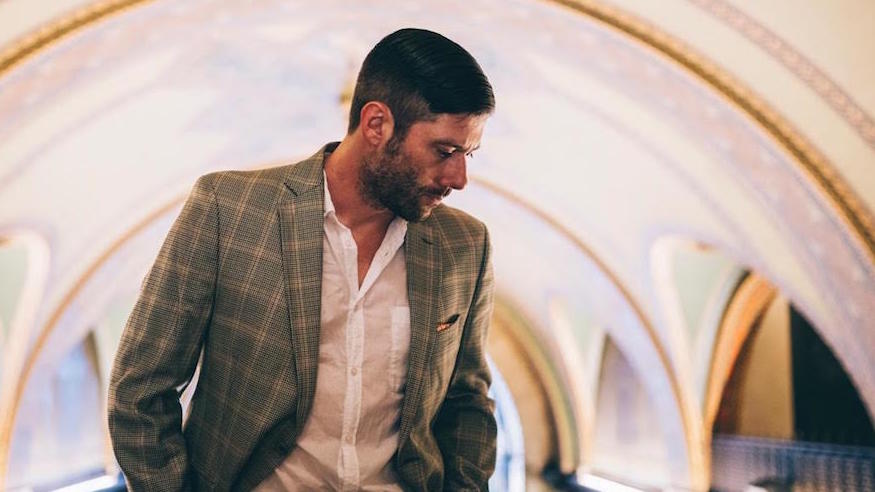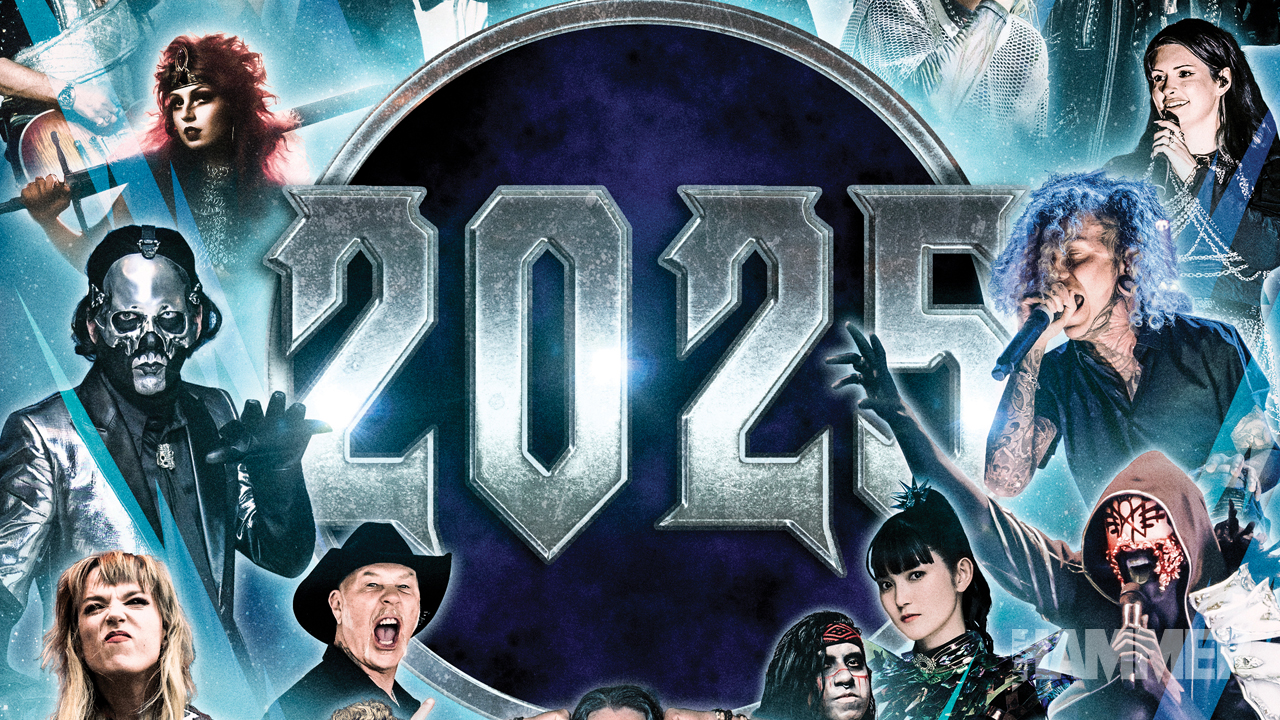Why Wes Borland wrote a soundtrack for an 80s film that doesn't exist
Wes Borland on his new album Crystal Machete, Limp Bizkit's legacy and why his home is full of cats

When not dressing like a tar-daubed witch or a zombie tourist in Limp Bizkit, Wes Borland has kept himself busy over the years with a number of side projects.
His need to record cosmic death country was satisfied in Big Dumb Face, whose 2001 debut Duke Lion Fights the Terror!! featured his brother Scott. Then there was the moody alt-rock of Black Light Burns, who’ve released two studio albums and two collections to date. In between sporadic shows with Limp Bikzit, Borland plays guitar alongside his fiancée Carré Callaway in art rockers Queen Kwong.
While Limp Bizkit’s seventh album Stampede of the Disco Elephants has been in the works for the last four or five years, the guitarist recently released his debut solo album, Crystal Machete. Written as a soundtrack to an imaginary ‘80s movie, it’s unusual for the fact it features no human vocals or distorted guitars.
We sat down for lunch with Borland, who over a couple of crab rolls and Bloody Mary cocktails, told us about his tripped out concept record, Limp Bizkit’s legacy and why his new Detroit home has become something of a cat rescue.
What sparked the idea to make Crystal Machete?
“Last year, I was on tour for eight months. In the time that I wasn’t on tour, I was moving across the US and renovating my new home, so I had no studio set up for quite a long time. That gave me about a year to think about the next musical project that I wanted to do. The concept was to have a record in which I got to showcase some of the things that I really love but haven’t gotten to do in Limp Bizkit. Black Light Burns had kind of ran itself out in my head too, and there wasn’t a lot more that I wanted to do with that project. I’d also run out of the need to be musically aggressive and I knew that was something I didn’t want to do anymore; I wanted to make something that would hold up over the years and be timeless, and also fun and beautiful but not shocking. I don’t have that youthful, rebellious emotion of wanting to shock people anymore. So I guess I could sum it all up by saying that I wanted to make an adult record.”
It’s different to anything else you’ve done, so where did you draw inspiration from?
The latest news, features and interviews direct to your inbox, from the global home of alternative music.
“Mainly from post-rock and electronic music. I love Tortoise and I love Boards of Canada. I also love Air, Daft Punk, Godspeed You! Black Emperor, Russian Circles, the lighter side of Pelican, and a little bit of Explosions in the Sky. I was definitely inspired by a lot of movie soundtracks too, particularly Vangelis and Tangerine Dream. I wasn’t afraid to delve into things that were slightly cheesy in an ‘80s way either, as far as using Simmons drum machines and analogue synths. These were all things that have always been very important to me and they’ve all been major building blocks for me as a musician, but I’ve never gotten to showcase them on an album before. It felt like it was finally time to do that, and I felt like I was finally able to do it.”
What was the most enjoyable aspect about recording this album, then?
“Working by myself. Over the years I’ve grown really fond of working alone and I enjoy not having to talk or explain myself to anyone else. I work really fast too, and I like not having to wait for anyone else because as soon as I start working on something I get into a flow. The record was mostly recorded from about seven in the morning until noon every day for five weeks, and I’d wake up super early and ready to work, then record for about five hours each day. That’s how it was done.”

Let’s talk about some of the tracks. What inspired the electronica of Svalbard?
“Svalbard is the most northerly inhabited place in the world; it’s an island owned by Norway where they do oil drilling off the coast and it’s mandatory that if you go outside you have to carry a rifle because of polar bear attacks. It’s just somewhere that I’ve always wanted to go because it’s so wild and remote. There was a period of time where I would just look at the place on Google Maps and get totally enthralled with it, as it just seemed like the end of the world to me. The song is the longest song on the album, I think it’s 11 minutes and 11 seconds, and it’s meant to be a musical representation of the desolate landscape up there at the edge of civilisation.”
Similarly with Vltava, is this album about places you’ve looked at on Google Maps?
“Vltava is the river in Prague, and I knew I wanted to name a song after it because Prague has always been a very significant place to me for many reasons. I actually turned 30 whilst I was walking across that river; it hit midnight from February 6th into February 7th as I was walking across the bridge over that river. There’s just something magical about that city. I’ve spent a lot of time there and had a lot of revelations whilst being there. So I always knew there was going to be tracks on the record called Svalbard and Vltava.”
White Stallion sounds like an ‘80s synth pop song.
“White Stallion sort of started as a joke. I basically just looked up what makes songs popular on the Internet and then incorporated those elements into the song. That’s why it’s 120 bpm and in the key of C, and why I hit the chorus in under a minute. It all started with me saying, ‘I’m going to make a hit song.’ I didn’t stick exactly to the hit song chord changes, but I followed the basic rules and sure enough after the album came out I looked up which track was the most popular on iTunes, and it was White Stallion. I really like the song, too.”
Where does the title Crystal Machete come from?
“As I was choosing what synthesiser to use for the album I was hunting down information on what was used for different movies, as I wanted that specific ‘80s sound, and I think a lot of those movies have a cheesiness and a corniness to them that’s very special. I’m talking about films like Krull, Legend, Labyrinth, Tron, Blade Runner and Death Race 2000. Even movies like Steel Dawn with Patrick Swayze are special and have this synthesiser sound that’s retro but also timeless. There was a lot of thought and research that went into watching those films and finding out about the composers who worked on the soundtracks, and what I found was that a lot of those films revolve around some sort of weapon or item. So Crystal Machete is the name of the fake film that this fake soundtrack was made around. In the title track there’s a spoken word section in the bridge of the song where this female adventurer tells the story of the quest for the Crystal Machete, and it’s supposed to be this pivotal moment of the film in my head, where she’s recalling what happened to her when she actually grasped this all-powerful item. I also love H.P. Lovecraft, so that’s kind of tied into that too.”
Are film soundtracks something you could see yourself doing in the future?
“That’s the dream. I’m planning on doing a follow-up to this album in October, and I’m hoping to do two a year going forward. I don’t want to get too far ahead of myself but it was really easy doing this one; I’m funding it myself and it’s expensive but it’s not as much as I thought it would be. So this is the beginning of me putting a calling card out there and saying, ‘This is what I want to transition into.’ I’d love to get to the point where I’m doing two albums a year and then films as well.”
Are there any filmmakers that you’d like to work with?
“I really loved It Follows [2014]. I also love Ti West who did The House of the Devil [2009]. I basically love horror and sci-fi films, but I think the people that I’d be collaborating with haven’t made a movie yet; it’s people who are up-and-coming and at the point with their film career where I am now with my film scoring career. So I hope to meet some people that want to do some interesting things and not have typical scores, but want to do something a little bit more adventurous.”
It’s a million miles away from Limp Bizkit. How do you feel about those early albums now?
“I look back on them as what was going on in my life at those times and I have negative and positive feelings about them, but I’m so far removed from them now that I don’t even feel like I was a part of it. They’ve taken on a life of their own to where I don’t really feel responsible for them anymore. I feel good about them, I guess, but I also feel so distant from them.”
How did you end up in Limp Bizkit in the first place, when your influences are so different?
“In Jacksonville, Florida there weren’t many people who were going to be my peers. I was still sort of trying to find myself and find out what I wanted to do. I was in a heavily experimental time making four-track recordings in my bedroom, and I was just learning what it was to write and make music. But I really hated it there. Jacksonville has three military bases and it’s home to the PGA golf tournament, and there was no arts outlet there at all. I think the artists that come out of Florida just want to get out and go somewhere else, because it’s a really oppressive place. And the people who aren’t oppressive there are fucking boring. It’s a fucking terrible place. But to answer the question, we were the people that wanted to start a band and get out of there, and that’s the band I was given.”
Are you proud of what the band achieved?
“I feel like we did a really good job, especially considering the differences in personalities and backgrounds. I think the fact that we were all so different was actually what made us so successful. Fred was definitely open minded to my extreme differences, and he never tried to change me or pressure me into not being myself.”
Do you still enjoy going out on tour with Limp Bizkit?
“Yeah, because there’s less work to do on tour than when I’m home, so it kind of feels like a holiday. I just go have a couple of cocktails with my guitar tech and joke around and act silly on stage. And the songs are so ingrained in me that I don’t even need to think about playing them. It’s a pleasure and it’s unchallenging. It’s like going on a familiar rollercoaster that you know every turn of; it’s still a rollercoaster and you’re still having a good time, but you know what’s going to happen.”
How do you feel about being forever associated with the nu-metal genre?
“I’ve never really liked any of the bands that are peers to Limp Bizkit. My guitar playing comes from a mix of Page Hamilton from Helmet, Tommy Victor from Prong, Les Claypool from Primus, James Hetfield and Duane Denison from The Jesus Lizard. Those guys all together became what I was doing, and that became nu-metal, which is a genre that I fucking hate. I don’t like Korn or Deftones or Soulfly or Papa Roach; basically any band in that entire genre I have zero interest in. It’s not that I hate them, I just don’t have any interest in any of it. And it’s fine if you like those bands, they’re just not for me. But somehow I ended up in a band that’s central to all of it [laughs].”
Are you at peace with that now?
“I guess I’m as at peace with it as I’m going to get. I still enjoy playing the shows, but it’s definitely time to move on as a musician. Even with Black Light Burns, the perception and execution of it was all wrong; I got into a whole other industrial goth ghetto with that band, and I can’t stand that either. Basically, I just hate everything that I’ve done so far [laughs].”
What do you think Limp Bizkit and Black Light Burns fans will make of Crystal Machete?
“I don’t really care. I’m just going to put it out into the world and do interviews with people like you, and maybe after I do like three more of these things it’ll start to get a following. But I’m not going to play with it live for a few years, because this would be so fucking boring live. I’m going to put more albums out first and then figure out how I’m going to do it live.”
Could you feasibly make a living out of doing that?
“Let’s talk about the music industry; living Carré’s life, which is now more than parallel to mine because we do so much together, and watching her deal with what she has to deal with as far as being in a band that’s trying to break and move ahead, it’s almost impossible now. It’s so expensive and the market is so saturated, and there’s so much noise now because everybody is in a band. There’s this thing happening that I like to call the ‘no talent movement’, where it’s all about how you look and who you know. And when you have technology that can basically do anything and put it out there then the cream doesn’t rise to the top anymore. It’s like the laws of physics were changed or something and now we’re living in a world where everything makes less sense. It seems like the end for everyone. The nuclear winter is coming, and I’m going to be on the Titanic playing my violin and just accepting the fact that no one is going to have jobs anymore. There was a time when I thought the government was going to intervene and finally go, ‘You know what, this is wrong. People are stealing from you.’ But they don’t give a fuck. The internet will never be policed in the right way, ever. All the right tools are being utilised in the wrong ways and it’s going to ruin everything.”
What’s the solution then?
“I don’t see one. Thankfully, I still have canned food. So I’m going to go until that runs out and then that’ll be it. Right now, I can still go and play shows with Bizkit for nostalgia reasons and that can fund all this other stuff that I’m doing. Without that, I wouldn’t be able to fund anything. I’d be back working a regular job, just trying to get by.”
We can’t end the interview on a downer. Tell us some good news before you go.
“Carré and I are getting married October 22 at the Detroit Institute of Arts, so that’ll be cool. We’ve also been using our house in Detroit as a cat rescue centre, and we’ve been pulling cats out of abandoned houses and neighbourhoods and helping them find new homes. I sold a bunch of old guitars and gold records and stuff too, and put a significant amount of the money that I raised into local cat rescues. So we’re stoked.”
Crystal Machete is out now through Edison Sound Records.
DJ, presenter, writer, photographer and podcaster Matt Stocks was a presenter on Kerrang! Radio before a year’s stint on the breakfast show at Team Rock Radio, where he also hosted a punk show and a talk show called Soundtrack Apocalypse. He then moved over to television, presenting on the Sony-owned UK channel Scuzz TV for three years, whilst writing regular features and reviews for Metal Hammer and Classic Rock magazine. He also wrote, produced and directed a feature-length documentary on Australian hard rock band Airbourne called It’s All For Rock ‘N’ Roll, and in 2017 launched his own podcast: Life in the Stocks. His first book, also called Life In The Stocks, was published in 2020. A second volume was published in April 2022.

